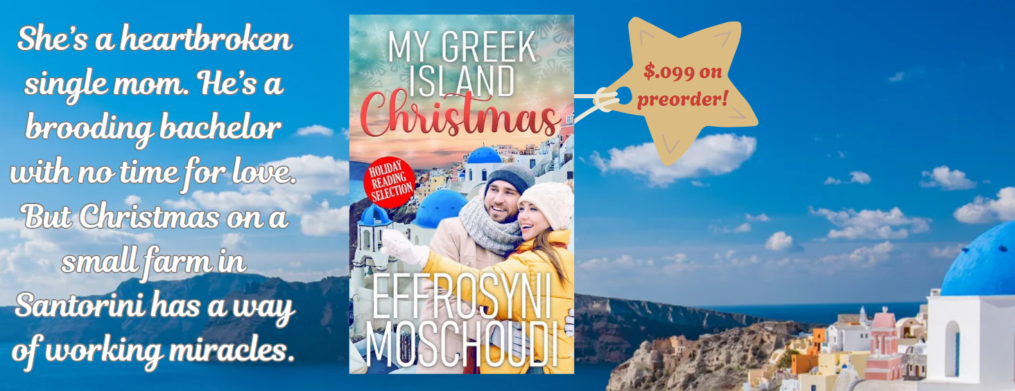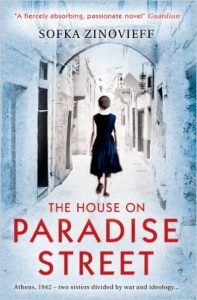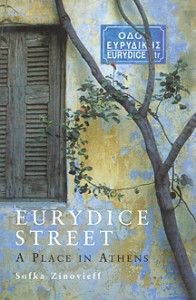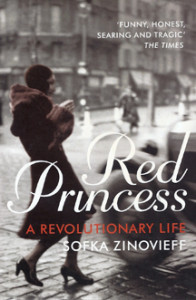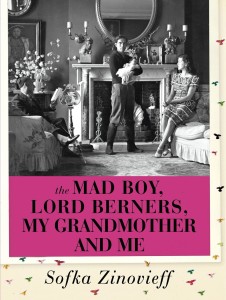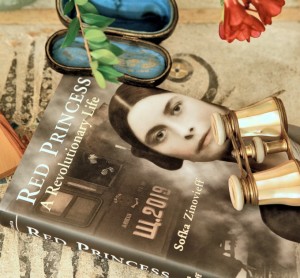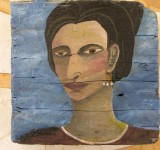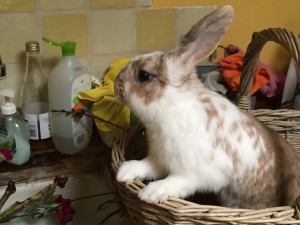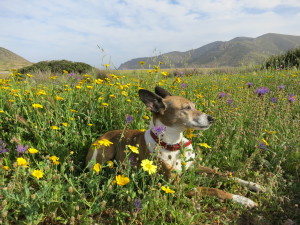Whoohoo! Boy, am I thrilled today! It’s not often that I have a traditionally published, widely known author on this humble blog. Come to think of it, this is actually a first, so excuse the ear-to-ear smile I’m wearing this fine morning. My special treat to you today is a chat with Sofka Zinovieff, author of the enchanting novel, The House on Paradise Street that follows the recent history of Athens for a few decades, including the gruesome years of the Civil War. If you’re looking for an unforgettable read about Greece and its tumultuous, modern history, look no further!
In 2008 Antigone Perifanis returns to her old family home in Athens after 60 years in exile. She has come to attend the funeral of her only son, Nikitas, who was born in prison, and whom she has not seen since she left him as a baby.
At the same time, Nikitas’s English widow Maud – disturbed by her husband’s strange behaviour in the days before his death – starts to investigate his complicated past. She soon finds herself reigniting a bitter family feud, and discovers a heartbreaking story of a young mother caught up in the political tides of the Greek Civil War, forced to make a terrible decision that will blight not only her life but that of future generations…
Sofka Zinovieff had fallen in love with Greece as a student, but little suspected that years later she would return for good with an expatriate Greek husband and two young daughters. This book is a wonderfully fresh, funny and inquiring account of her first year as an Athenian. The whole family have to get to grips with their new life and identities: the children start school and tackle a new language, and Sofka’s husband, Vassilis, comes home after half a lifetime away. Meanwhile, Sofka resolves to get to know her new city and become a Greek citizen, which turns out to be a process of Byzantine complexity. As the months go by, Sofka’s discovers how memories of Athens’ past haunt its present in its music, poetry and history. She also learns about the difficult art of catching a taxi, the importance of smoking, the unimportance of time-keeping, and how to get your Christmas piglet cooked at the baker’s.
Born in 1907 in St. Petersburg, Princess Sophy “Sofka” Dolgorouky was born into a world of privilege and nobility—ten short years later, Sofka’s world would crumble when the Tsar and his family were overthrown, exiled, and executed. Burning with shame, Sofka and her family fled to England and then to Paris, where Sofka quickly embraced the bohemian culture of the 1920s and 1930s. During the Nazi occupation, Sofka would leave her first husband only to lose her second. Interned in a Nazi prison camp, she worked with the French Resistance and discovered communism, whose cause she would ironically continue to uphold for the rest of her life, becoming an outspoken member of the British Communist party and even leading tour groups for workers visiting the Soviet Union. But what was even more outrageous in its day than her conversion from princess to communist was Sofka’s private life. She not only believed in sexual freedom, but often placed love, literature, and adventure before even her own children. Sofka was much more than a princess in exile—she was someone whose existence was constantly dislocated by revolution, yet nonetheless believed in revolution as a way of making the world a better place (16 b&w illustrations).
Faringdon House in Oxfordshire was the home of Lord Berners, composer, writer, painter, friend of Stravinsky and Gertrude Stein, a man renowned for his eccentricity – masks, practical jokes, a flock of multi-coloured doves – and his homosexuality. Before the war he made Faringdon an aesthete’s paradise, where exquisite food was served to many of the great minds, beauties and wits of the day.
Since the early thirties his companion there was Robert Heber-Percy, twenty-eight years his junior, wildly physical, unscholarly, a hothead who rode naked through the grounds, loved cocktails and nightclubs, and was known to all as the Mad Boy. If the two men made an unlikely couple, at a time when homosexuality was illegal, the addition to the household in 1942 of a pregnant Jennifer Fry, a high society girl known to be ‘fast’, as Robert’s wife was simply astounding.
After Victoria was born the marriage soon foundered (Jennifer later married Alan Ross). Berners died in 1950, leaving Robert in charge of Faringdon, aided by a ferocious Austrian housekeeper who strove to keep the same culinary standards in a more austere age. This was the world Sofka Zinovieff, Victoria’s daughter, a typical child of the sixties, first encountered at the age of seventeen. Eight years later, to her astonishment, Robert told her he was leaving her Faringdon House.
Her book about Faringdon and its people is marvellously witty and full of insight, bringing to life a vanished world and the almost fantastical people who lived in it.
Hello Sofka and welcome to my blog!
Hi Fros, I am very happy to be here!
You know, I don’t have words to describe how much I loved The House on Paradise Street! Tell us, what has inspired you to write a story about my country and its recent history?
I was inspired to write The House on Paradise Street (Short Books, 2012) because I was increasingly aware of the powerful legacy of the Greek civil war in contemporary Greece. The more I found out about the horrors of what went on after World War II, the more significant they appeared and it was shocking how many people outside Greece knew little of this phase of history. Even harder for me as a British citizen, was discovering the troubling role of the British army, which turned against its former allies (the resistance against the Nazi occupiers) and fought them as the communist enemy. Many families were divided by the Civil War – brothers fought on different sides – but I was keen to look at the women’s story and describe how two sisters became enemies. The book follows three generations of an Athenian family from the middle of the twentieth century to the riots of 2008.
The Civil War is a shameful part of Greek history. Perhaps that’s why the Greeks avoid talking about it… the harm done runs very deep, I think. Anyway, on to the next question. What was the first thing you ever wrote and how old were you then?
I wrote diaries and stories from a very young age. I have exercise books that I filled in from when I was 7 or 8, so it’s hard to specify the very first thing I wrote. I always loved reading and the two occupations went hand in hand.
What other writing have you done? Anything else published?
My first long piece of writing was my PhD thesis about modern Greek identity and the impact of foreigners and tourists. I lived in Nafplion and these years laid the foundation stone for a life-long attachment and deep involvement with Greece. After leaving behind the academic world, I worked as a freelance journalist for many years and I think that was good practice for just getting on and writing. I was lucky enough to live in very interesting places – Moscow during the fall of the Soviet Union and later, Rome in the late 1990s – and was able to send pieces back to England to various magazines and newspapers.
I have also published 3 other books:
Eurydice Street: A Place in Athens (Granta, 2004) is a description of my return to Greece with a Greek husband and our two young daughters after years away. It is part memoir (what it’s like to bring up children in modern Athens), part anthropological exploration of what it means to be an Athenian and part travel literature about the atmosphere of Athens. I spoke with politicians, priests and prostitutes, tried to get Greek citizenship, and learned all about the stresses of an education system that expects mothers to do hours of homework every day with their young kids. Among other things, I analysed the art of hailing a taxi that is already occupied, how to cook your Christmas piglet at the local bakery, the 2 a.m. rush hour and why you should avoid saying ‘thank you’ to your in-laws.
Red Princess: A Revolutionary Life (Granta, 2007) is the story of my Russian Grandmother. Born a princess in pre-revolutionary St Petersburg, my father’s mother fled the Bolsheviks, grew up in England and then became a dedicated communist! She was unapologetic about being an adventurer – a sexually liberated lover of poetry and literature, who helped save Jewish lives in a Nazi camp in occupied France during the Second World War. It was an amazing experience to follow in her footsteps and meet people who had loved her and hated her.
The Mad Boy, Lord Berners, My Grandmother and Me (Jonathan Cape, 2014) is another family memoir. I trace the bizarre history of my maternal grandfather, the Mad Boy, and how he came to live with his much older lover, the eccentric composer Lord Berners, at Faringdon House. There were visits from Salvador Dali and Stravinsky, collaborations with Gertrude Stein and Diaghilev, and nobody suspected that the Mad Boy might suddenly get married and have a baby… The cover shows a photograph taken in 1943 by Cecil Beaton, with Lord Berners on the left, the Mad Boy and his bride (my grandmother). The baby is my mother. I only went to stay for the first time with the Mad Boy when I was 17 and an unlikely friendship developed that led to a shocking development eight years later.
All this sounds marvellous! Any hobbies or interests that you enjoy in your spare time?
I love gathering up driftwood and painting on it or creating hangings with bits of glass, scrap metal or shells. I also play the piano and gardening is something that inspires and soothes.
Love what you’ve done with the shells! What are you working on at the moment? Tell us a little about your current project(s).
I’m currently writing a novel, set between today and the 1970s. Greece will enter into the story but the location is basically London.
Yay! Being a fan of your work, I can’t wait! What genres do you read mostly, and what are you reading now?
I read more fiction than anything else, but I love memoirs and biographies too. I’m reading Miriam Toews’ remarkable novel All My Puny Sorrows that is based on her own experiences. Although it tackles a miserably dark subject – her talented, beautiful older sister’s insistence on committing suicide, it is written with humour, beauty and a wicked intelligence. This year I’ve also hugely enjoyed Elena Ferrante’s Neapolitan Trilogy.
Tell us about your website/blog. What will readers find there?
My website has sections for all four of my books, with reviews and interviews. There’s also a biography with photos, a section for events like book readings or literary festivals and there’s a small section with some of my driftwood and ceramic art.
What a lovely painting, well done! Being an author involves a lot of sitting around. What do you do for exercise?
My favourite form of exercise is swimming and I’m extremely happy if I can get into some water. When I live in Greece I usually have a daily swim for about 6 months of the year as we live by the sea and also near to a thermal lake. I also like walking and (in short bursts) running and during the last couple of years I’ve become devoted to yoga, which has opened up a new approach to exercise for me.
I love yoga! Perfect to relax the mind as well as to exercise the body. Describe your workstation. Are there any favorite objects you have there for inspiration?
I’d describe my desk as being an orderly clutter – I basically know what’s there even if it looks messy. There are piles of papers, letters and books, a small jug of flowers, a cup of pens and pencils, a few stones and shells I’ve collected at favourite beaches, the odd postcard I’ve been sent, a bottle of eau de cologne and some hand cream…
Sounds like mine, LOL. Last question: do you have any pets?
Yes, I do, and I’ve brought photos to show your readers. Here’s Barnaby, our house rabbit…
Oh, so cute!
And that’s Lily, now 17. This is a few years back in Greece.
A doggie! Doggies are always welcome in this blog. And what a stunning photo! Well, Sofka, it’s been a real honour to have you here today. Thank you so much for coming!
Thank you too, Fros. It’s been a pleasure.
I was born in London and was named after my Russian grandmother. Both my father’s parents were émigrés from St Petersburg, who fled the Russian Revolution. My father ran an electronic music studio from home, and I’d get back from school to find musicians like Pink Floyd or Harrison Birtwistle trying out the synthisizers. I read social anthropology at Cambridge and first lived in Greece while doing the research for a PhD on modern Greek identity and tourism in the late 1980s.
While living in Moscow and Rome I worked as a freelance journalist for mainly British publications including The Independent Magazine, The Telegraph Magazine, The Times Literary Supplement, The Financial Times and Tatler. I am married to Vassilis, who is Greek, and we have two daughters. We lived in Athens from 2001-2014, during which time I wrote my first book (2004) and then three more. We are currently dividing our time between Greece and England, where we have an ancient dog, an independently-minded house rabbit and a flock of coloured doves (for more explanation of this, see this post on my site: The Mad Boy, Lord Berners, My Grandmother and Me )
Visit Sofka’s Amazon page
Visit Sofka’s website
Visit Sofka’s Facebook page
 Have you enjoyed this post? Follow the blog (see right sidebar) and miss no more posts! Sign up to Effrosyni’s newsletter to keep up to date with her news and special offers (very sparse emails). Interested to read more? Head over to Effrosyni’s Blog, where you’ll find her earlier interviews, book reviews, author tips, travel articles and even Greek recipes!
Have you enjoyed this post? Follow the blog (see right sidebar) and miss no more posts! Sign up to Effrosyni’s newsletter to keep up to date with her news and special offers (very sparse emails). Interested to read more? Head over to Effrosyni’s Blog, where you’ll find her earlier interviews, book reviews, author tips, travel articles and even Greek recipes!
